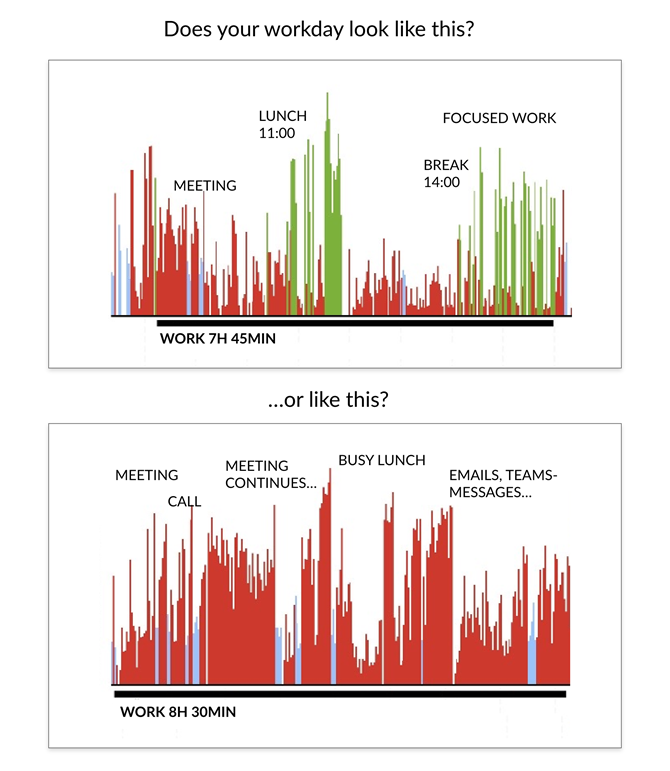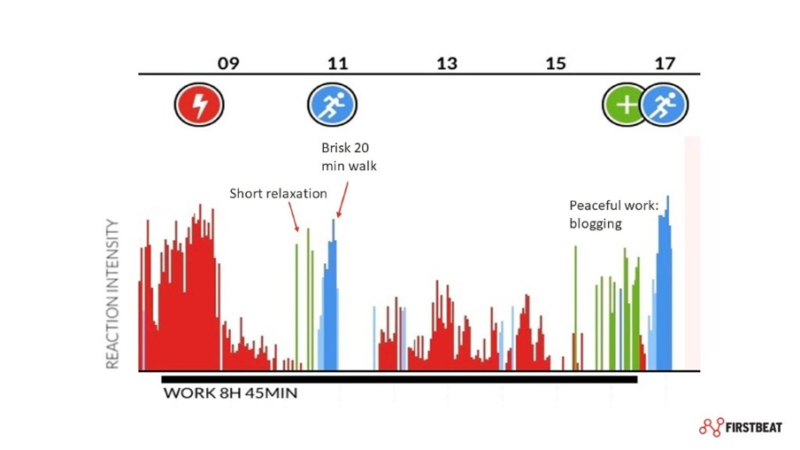
Taking breaks during work and having moments of daytime recovery have been raised as key wellness topics recently, especially due to the challenges surrounding increased remote working. And with good reason. Firstbeat’s database, consisting of hundreds of thousands of measurements, reveals that roughly one third of employees do not have any recovery at all during the workday.
But what does recovery during the day mean? Is it not enough that we recover when we sleep?
Recovery is often defined as the opposite of stress – a physiological process during which the activation level drops, and the body’s physical and mental balance is restored. Recovery (shown as green in the Firstbeat graph) is like the body’s brake. Its job is to keep the ‘speed’ appropriate in different situations and it is needed to keep our stress levels in check. Moments of recovery during the day improve our workflow and focus, provide energy for leisure time activities, and help us prepare for good-quality sleep.
Good Recovery Starts During the Day
You might be thinking. ‘I sleep enough so why does daytime recovery matter?’ And it is true that sleep is the most important recovery period to enable good performance and high energy. But good sleep is built during the day. If the body is in a constant stress state all day due to too much activity and a heavy (work)load, the body can get stuck in a wired and activated state – and might not recover even during sleep. That is why we need to use the brakes strategically, at the right times.
And, like when at the wheel, it is better to brake slightly early than too late because, if stress becomes chronic, the body is no longer able to slow down even when we make the effort to do so. Data from Firstbeat measurements allows you to see your recovery patterns during the day and night, so you can learn from the data, react early and be proactive rather than reactive.

Figure 1. Recovery is shown in the Firstbeat graph as green and stress as red. It’s good to aim for even short recovery moments during the day. This can happen during designated breaks, but you can also recover, for example, during mindful work.
By comparing your Firstbeat results from different days you can see how different activities affect your recovery. For example, does listening to music or a short stretching break help you lower your stress levels and recover? Or maybe a device-free tea break does the job? With time, it becomes easier to recognize what works for you, and when. Sometimes you might need a more activating break. Any kind of physical activity helps interrupt the daily stress cycle and increases the chance of healthy sleep.
We don’t need to stress about getting huge amounts of daytime recovery. It is completely normal that, when we are awake, our body is mainly activated and ready for action – effectively in some kind of “stress state”. Even just a small amount of recovery alongside good-quality sleep is good for us. And don’t forget, recovery and building a better rhythm for our days can (and should) be practiced and learned!
The appropriate solution depends on the individual and the nature of a given day. It’s typical that very busy days do not have much recovery, and we all have those. We just need to remember to balance our lives with days that are not as tightly packed and become better aware of what our body needs and when.
Remember…
- If your work is mainly sitting or standing, you might benefit the most from a short exercise routine or a walk outside. An active break might not produce physiological recovery in that moment (or show up as a green bar in the Firstbeat graph) because it elevates the heart rate, but it relaxes you mentally, lowers stress level and promotes recovery with a short delay.
- If you have a physically demanding job, you need breaks that slow you down. If work is physically so demanding that it looks and feels like light or moderate exercise, it’s crucial to have regular breaks to relax the body and slow the heart rate. Sitting down for a moment, or a conscious relaxation exercise, help to recharge you for the next work effort.
- If you follow a heavy physical exercise program, then daytime recovery, in addition to sufficient sleep, is very valuable to reap the full benefits of exercise. Otherwise, the body does not recover, and you will not see fitness improvements.
- All of us, regardless of the kind of work we do, should be able to calm the mind and body down with activities that work for us. This prevents stress buildup, structures the day in a healthy way and helps maintain good focus.

Figure 2. A busy morning of work followed by a relaxation moment (green) and walk outside (blue). Here, energy level was good after the break, but stress level stayed lower, with the final hour of work showing up as recovery.
Above is an example of my own day. After a somewhat restless night, I was a bit tired, and work felt a bit laborious in the morning. I managed to break up the stress by doing a short relaxation exercise (green bars) and going on a 20-min brisk walk outside (blue bar).
In an ideal situation, I would schedule the two breaks at slightly different times of the day, for example a relaxation moment mid-morning and a short physical break during the typical afternoon slump. This time my schedule did not allow it, but the “power break” that combined relaxation and physical activity seemed to work well. In the afternoon, my stress levels were lower, and I felt energetic. At the end of the workday, writing a blog (a task that I typically enjoy) showed up as recovery.
Tips for Structuring Your Day and Enhancing Recovery:
- Schedule a few short breaks into your workdays. Mark them in your calendar if you tend to forget them.
- Try different kinds of breaks and learn what works for you. Such as…
- A five-minute energizing exercise routine (find tips online or create your own)
- Peaceful stretching (especially back and shoulders)
- Tea break and casual chatting with a colleague (virtually or face to face)
- Brisk walk outside
- Deep-breathing exercise for five minutes
- Listen to music (lie down and relax your back)
Want to see how micro-breaks and daytime recovery effect your stress levels?
You might also be interested in

Are You Increasing or Decreasing Your Body’s Resources?
We face a lot of different stressors throughout the day. Feeling hurried, general stress, mental and social pressure, a constant flow of stimuli, physical load, and unhealthy lifestyle habits all…

Are You Balancing Your Stress with Enough Recovery?
Stress has a negative connotation but, in reality, it’s not dangerous and you don’t need to avoid it. The important thing is making sure it is in proportion to your…

